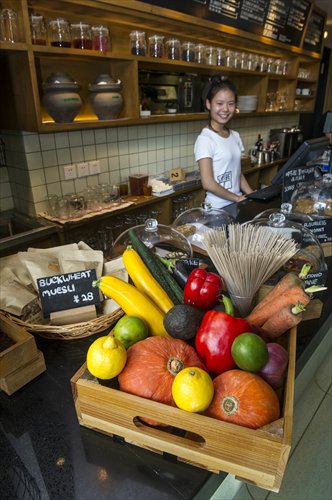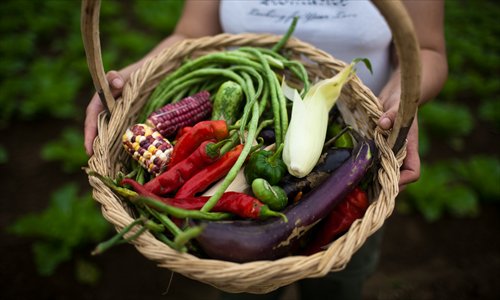

Organic vegetables proudly on display at the counter of Tribe, an organic bistro in Beijing's Chaoyang district. Photo: Li Hao/GT

Assorted vegetables from Little Donkey Farm. Photo: Li Hao/GT
"You are what you eat, drink and breathe," said Yu Min, co-founder of Tribe, a recently opened bistro in Chaoyang district which aimed at health-conscious eaters. "Almost 80 percent of the ingredients are sourced from certified local organic farms."
In recent years, the organic food movement has taken off in China, spurred on by the widespread public perception that organic food is safer and more nutritious than conventionally produced food.
A survey conducted in 2012 by Washington DC-based think-tank Pew Research indicated that 41 percent of Chinese consumers considered food safety to be a major problem, and according to a research report published last year by The Economist, China's domestic organic food market is the fourth largest in the world.
While there are a number of regulatory bodies in China to give certification to organic farms that adhere to standards set out by the government, at present, there are no equivalent certifications for restaurants or cafes that declare themselves as organic.
So how can consumers know whether Beijing's "organic" restaurants are really organic?
A matter of trust
Aden Chang, co-founder of Rug Bagel & Cafe which has two branches in Chaoyang district, estimated that his eatery was one of around 10 restaurants in Beijing that serve organic food.
"We don't claim to be a 100 percent organic establishment," said Chang. "I would say that around 50 percent of our dishes and ingredients are organic."
Given that there are currently no certifications for restaurants claiming to be organic in China, any claims restaurants might make to being organic depends on their ingredients being sourced from certified organic farms.
"Some organic farms said they are organic, but it is not really true," said Gordon Chan, one of the other co-founders of the cafe. "We are very cautious in selecting local providers, and frequently visit the farms we work with."
Chang said that Rug Bagel & Cafe sources most of its vegetables from Derun House, a farm in Beijing's Changping district that follows organic farming practices, although it has not been certified by any government-sanctioned bodies.
"Although it does not have any certifications, we know the owner of the farm and have visited the farm. We've tasted the produce there, and we believe in its quality," said Chang. "Other products such as Shengmu organic milk and Green Yard organic milk are from certified organic farms in Beijing. Our Organic Fair-Trade coffee beans are imported from certified organic farms overseas."
Tribe sources most of its organic ingredients from TooToo Farm, according to Yu.
TooToo Farm has been certified as organic by both the relevant European Union bodies and the China Organic Food Certification Center.
Stephen Barrie, a 68-year-old doctor from California who is a frequent patron of Tribe, said that in the absence of official certifications for organic restaurants in China, it came down to whether you believed the owners of a given establishment were trustworthy or not.
"At the moment I guess it's a matter of trust," he said. "For me, meeting the owners of Tribe, talking with them, I feel their passionate commitment to organic food. Although they don't have certification, I believe in them and I believe I can get organic food here."
Copyright ©1999-2018
Chinanews.com. All rights reserved.
Reproduction in whole or in part without permission is prohibited.